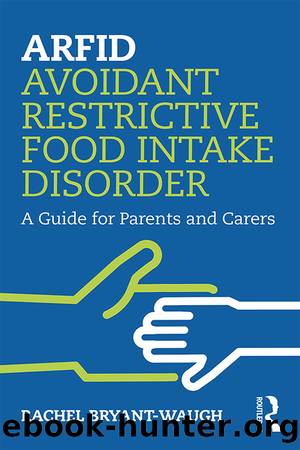ARFID Avoidant Restrictive Food Intake Disorder by Rachel Bryant-Waugh

Author:Rachel Bryant-Waugh
Language: eng
Format: epub
Publisher: Taylor and Francis
Published: 2020-01-15T00:00:00+00:00
Nutritional inadequacies or deficiencies
Avoidance and restriction of food intake can result in too little being eaten overall, as above, or it can result in too few of some foods being eaten, leading to an unbalanced diet. In the discussion on characteristics (Chapter 1: What is ARFID?), the terms micronutrients and macronutrients were used in relation to a healthy diet. Micronutrients are the vitamins and minerals present in many foods, usually in only small amounts, but nonetheless an essential part of a balanced diet that meets the bodyâs needs. Macronutrients are the major food groups, such as carbohydrates, fats, proteins, which we need in larger amounts and are equally important to include in the diet. Together the micro- and macronutrient profile of any one personâs diet will play a part in their general health and well-being, and in children, also their development. Good nutrition makes us feel better and allows us to function better.
The bodyâs needs for these nutrients change with age and stage of development, with most requirements rising steadily throughout childhood and through adolescence. Some children with ARFID may struggle to increase their intake of certain foods in line with their needs, while others may avoid entire food groups. Most countries publish national guidelines for recommended intake of different nutrients, with most stating that under normal circumstances requirements should ideally be met through the diet. Exceptions to this are some of the recommendations for very young children; in the UK for example, the current government recommendation is that all children under the age of five years should have their food and fluid intake supplemented by vitamin A, C, and D drops. It can be difficult for us all as parents to get the balance right in our attempts to make sure our children are getting what they need. It is not the intention that people should spend hours doing complex calculations or weighing or measuring their childrenâs food. General guidance about macronutrients in the form of a balanced diet, if followed, will generally suffice. Recommendations and dietary guidelines are put in place to limit the likelihood of people developing nutritional deficiencies, which may be harmful to health and development.
This is not intended to be a nutrition handbook and so an exhaustive list of all the possible consequences of inadequate nutritional intake is not included here. In children with ARFID some of the more commonly encountered consequences are iron deficiencies leading to anaemia, calcium and vitamin D deficiencies leading to poor bone health and rickets, vitamin A deficiency leading to eye and skin problems, and in some cases vitamin C deficiency leading to scurvy. Deficiencies at this level represent serious problems that can impair childrenâs health and certainly require attention.
As with insufficient energy intake, inadequate nutritional intake can not only have a direct impact, here in terms of deficiencies expressed as physical conditions, it can also have a wider impact on development and everyday functioning. Good nutrition is important for brain development and throughout childhood and adolescence, your childâs brain is constantly developing.
Download
This site does not store any files on its server. We only index and link to content provided by other sites. Please contact the content providers to delete copyright contents if any and email us, we'll remove relevant links or contents immediately.
| Allergies | Asthma |
| Autism & Asperger's Syndrome | Cystic Fibrosis |
| Down Syndrome | Eating Disorders |
| Epilepsy | Learning Disorders |
| Lice | Special Needs Children |
I Capture the Castle by Dodie Smith(2028)
The Heavy by Dara-Lynn Weiss(1799)
Aspergirls by Rudy Simone(1693)
Be Different by John Elder Robison(1642)
Autism's False Prophets by Paul A. Offit(1530)
My Child's Different by Elaine Halligan(1501)
Smart but Scattered—and Stalled by Richard Guare(1486)
101 Tips for the Parents of Boys with Autism by Ken Siri(1477)
Asperger Syndrome (Autism Spectrum Disorder) and Long-Term Relationships by Ashley Stanford(1416)
What's Making Our Children Sick? by Michelle Perro(1410)
ADHD by Mark Selikowitz(1388)
Girlish by Lara Lillibridge(1372)
On Immunity: An Inoculation by Biss Eula(1355)
An Adult with an Autism Diagnosis by Gillan Drew(1337)
Nerdy, Shy, and Socially Inappropriate by Cynthia Kim(1334)
Animal-assisted Interventions for Individuals with Autism by Temple Grandin(1319)
The Cities by K.A Knight(1305)
Sarah's Child (Hqn Romance) by Linda Howard(1304)
Seeing Ezra by Kerry Cohen(1300)
